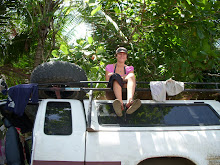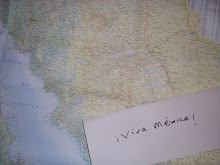Ninety days in Costa Rica have been completed in Costa Rica. After ninety days in Costa Rica, tourist visas expire. Most expats are here on tourist visas and regularly leave the country to renew. With our first ninety days closing in we headed south to Panama in effect, completing the stated goal of Surfari Collin of traveling by truck from California to ... Panama.
I've heard it so many times and heeding the warning has kept me out of trouble in other countries, but in the joy of it all, this tiny bit of information fell off the back burner and out of mind; humans have visas, vehicles have visas, and the two are not one and the same.
I was ready to tackle the border by myself. No guide, just me and my gramatically challenged Spanish. Brad and I had gone through the order of stamps and had it down;
humans exit Costa Rica, dog exits Costa Rica, truck exits Costa Rica, humans enter Panama, dog enters Panama, truck enters Panama. 72 hours later repeat the same process in reverse.
Step one went fine. Humans exited Costa Rica. Then the truck exited Costa Rica. Then a crotchety official handed me the paperwork, tearing up my vehicle permit and said, "Ok, leave and do not bring the vehicle back for three months."
What? Three months! This of course would not have been a problem if we were planning on leaving Costa Rica for three months anyway. But we weren't. Brad's mom, Jan, and her husband, Pierre, were flying in to Palmar Sur, Costa Rica to visit us in just 5 days.
As can usually be expected, a "guide" popped over my left shoulder, very reminisent of the sneaky-sneaky butler in Mr. Deeds.
"What is the problem?" surprise guide asked the official. The official told him what he told me. Then surprise guide motioned us out side and broke down the situation.
So what were our options?
1. Bribe the official for another 3 month permit for the vehicle. (This official was "muy duro" and would not budge.) 1.a Tomorrow approach another official for this permit at a cost of $600 USD
2. Leave the vehicle in storage in Panama for 3 months.
3. Import the vehicle. Car Tico, problem solved at a cost of .... "let's go talk to the lawyers."
It is worth noting at this point that Paso Conoas is the chillest border town that we've encountered in Central America to date. It's also the first border where we had a clean cut guide that didn't appear to be on crack and pushing us through the border to get his cut and next high.
Our clean cut guide is named Eddie. Eddie has the system down. He's 19, studying Business at the University of Panama in David, a serious soccer player and a preacher's son. This is his job and it's all business. The kid's a natural. He also gave us his cell# in case any of our friends might need border guides... what an entrepreanuer, clintelling all on his own. His name really is Eddie so ask for him if your at that border and need help.
The import tax on our truck ran just above $1500 USD. Vehicles older than 2002 are taxed at 80% of estimated value. Vehicles between 2002 and 2004 are around 65% and 2004 and newer are taxed at 50% estimated values.
With service fees to our guide, lawyers, notary, officials, hotel room and food, and the import tax, the process took 2 days and $2000 USD.
We made it in time to pick up Jan and Pierre in Palmar Sur and other than a crater in our bank account, everything turned out just fine.
For more information on importing your vehicle to Costa Rica visit Hacienda.gob where you can obtain exact import fees. To estimate the cost of the vehicle our notaries went to carfax, car tica and kelly blue book then compiled an average price for the truck's make and model. In addition to importation at the border there is a vehicle inspection called Riteve at the R.T.V. office. The cost for this starts at $20. We definitely reccomend having a trustworthy mechanic travel with you to the RiTeVe field inspection office if you have never done it before.
Also note that a lawyer must submit your paper work in order to obtain Costa Rican Plates. We paid about $150 USD for this. Generally speaking, attorneys that do not speak English cost less and know the system just as well.
You must also pay "marchama" at the INS office which is a tax for the right to circulate Costa Rica in your vehicle. I am told that this cost depends on the vehicle. We paid $50. So here we are in Costa Rica with a Costa Rican truck and we still have not made it to Panama. With that still on the agenda we just may need to extend this trip...
















